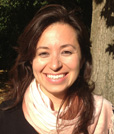
Dr. Erika Diaz Almeyda, PhD from the Pennsylvania State University
Current postdoc at Emory University in the lab of Dr. Nicole Gerardo
http://www.physiology.emory.edu/FIRST/almeyda.html
PSW: When did you begin making moves towards a post-doc position (i.e. talking with potential mentors, researching grant funding, etc.)?
EDA: I began talking with potential mentors 1 year before finishing my PhD. I chose what grants to apply to 1 year in advance by check everyday on Facebook groups and mailing list for potential options for postdocs.
PSW: Did you receive funding from a mentor, grant organization, or the university? If one of the second 2, who were you funded by?
EDA: I am funded by the FIRST [Fellowships in Research and Science Teaching] program at Emory University, which is funded by NIH.
[http://physiology.emory.edu/FIRST/]
PSW: When determining a mentor, was it someone you already knew personally through a colleague or a conference, or did you cold call/e-mail someone?
EDA: My PhD advisor knew my current mentor (Nicole Gerardo). I also contacted another potential mentor just by e-mailing them my specific interests in their research along with my CV.
PSW: Did you have in mind multiple places when you considered a post-doc or did you know from the beginning one school or mentor that you wanted to work with?
EDA: I knew I wanted to be in Atlanta so I looked for several options. I applied only to the ones I was really interested in.
PSW: How far in advance did you apply for funding? What was the timeline as far as defending, applying for funding, and moving/beginning a postdoc?
EDA: I was planning to finish my PhD in May and start working my postdoc in September. I applied for funding in March but had worked on applications since January.
PSW: What made you choose the school that you did? What skills or experiences are you looking to gain from your post-doc?
EDA: I like Emory’s philosophy on the quality and focus of the research done here. I also had very good references about Nicole and it seemed to me she would be a great mentor for me. My FIRST fellowship is partially for teaching as well as research. Since I’m very passionate about both, this was the perfect option for me.
PSW: How did your experiences in graduate school help you gain skills for your post-doc?
EDA: There are many skills I have now that are useful for my postdoc such as research skills, scientific knowledge, getting used to living in the US, etc. I felt it was more clear what kind of mentor was good for me, what kind of work environment I was looking for, and what the new research skills and/or knowledge that will be useful for me to learn.
PSW: How long (ideally) do you plan on being a post-doc? What are your ultimate career goals?
EDA: I would like to be a postdoc for 3-4 years and then I would love to teach/research at a liberal arts college.
PSW: Any other thoughts on being a post-doc or advice to current graduate students on the way to postdoc-ing?
EDA: Not all jobs require a postdoc, so just make sure you have some idea of what the next goal is and if a postdoc is required for that kind of job. Research and ask lots of questions about mentors, labs, and work environments. This will save a lot of time and make your postdoc enjoyable! In addition, this website is helpful to learn about career options: http://myidp.sciencecareers.org.
